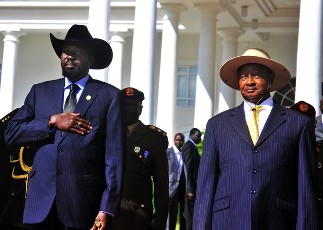Juba attempts to diffuse diplomatic row over presence of Ugandan troops
January 26, 2014 (JUBA) – South Sudan’s government attempted on Sunday to prevent further soaring of diplomatic relations with neighbouring countries over the deployment of Ugandan troops in the new nation since fighting broke out between rival members of its army in mid-December last year.
 After initial denials that the Ugandan People’s Defence Force (UPDF) was fighting alongside the South Sudanese army (SPLA), Kampala has admitted that it was involved in combat operations, and not just to secure Juba airport and help evacuate its nationals, as previously claimed.
After initial denials that the Ugandan People’s Defence Force (UPDF) was fighting alongside the South Sudanese army (SPLA), Kampala has admitted that it was involved in combat operations, and not just to secure Juba airport and help evacuate its nationals, as previously claimed.
The South Sudanese rebels who defected from the SPLA, say that Uganda’s military intervention was “fuelling the conflict” and have repeatedly cited UPDF presence in the country as the main reason – along with the arrested political detainees – that it took so long for the two-sides to sign a ceasefire deal in Addis Ababa, Ethiopia.
Uganda’s decision to intervene was also questioned on the basis that it should have remained neutral as a leading member of the East African regional bloc (IGAD) – that mediated the talks.
Diplomatic sources say that Uganda’s swift intervention and President Yoweri Museveni’s threats against the rebels led by South Sudan’s former vice-president Riek Machar shocked neighbouring Ethiopia, Kenya and Sudan.
Mark Nyipuoc, the deputy speaker of South Sudan’s parliament became the latest official to defend the presence of the UPDF, claiming the Ugandan military were in the country prior to the rebellion as part of the regional force fighting the Lord’s Resistance Army (LRA) rebels.
Forces from Uganda and other regional countries affected by the LRA’s over two-decade insurgency, have long been stationed in South Sudan to help fight the Ugandan rebel group.
“It was in this context that it became necessary for UPDF to provide security and protection of the Ugandan nationals here,” said Nyipuoc.
The LRA have not been active in South Sudan for some time and are now thought to be scattered in the Central African Republic as well as the north east of the Democratic Republic of Congo.
Nyipuoc told Sudan Tribune that both the South Sudanese government and its people appreciated the support they received from Uganda and the other neigbouring countries.
“Uganda is one of the genuine friends in the region. The government of Uganda and its people have never turned away from us whenever we need the support. It is one of the countries in the region which has never changed”, he exclusively told Sudan Tribune Sunday.
Rebecca Nyandeng, one of President Salva Kiir’s fiercest critics within the ruling SPLM described the presence of Ugandan troops in South Sudan as an “invasion”.
DIPLOMATIC MISSION TO KHARTOUM
Sudan, which has long had poor relations with Uganda as it hosts a number of Sudanese rebel groups, civil society and media organisations in exile, has had serious misgivings about Kampala’s role in the conflict.
The South Sudanese government and media has remained silent over reports that presidential advisor on legal affairs, Telar Deng, is visiting to the Sudanese capital Khartoum, to deliver special message from President Kiir.
Many observers, however, view the visit as an attempt by the Juba government to diffuse the bitter diplomatic row between Khartoum and Kampala over Uganda’s involvement alongside the SPLA in the recent conflict.
Despite allowing South Sudan to secede in 2011, Sudan still relies on transit fees from the young country’s oil fields to support its flagging economy.
Deng, according to the press in Khartoum, conveyed a message of special thanks and appreciation to the Sudanese government and its people for assisting the 17,000 South Sudanese citizens who have fled the conflict by entering into Sudan.
Over half a million people have been displaced by the conflict, which began on December 15 when tension within the ruling SPLM, spread among the army.
Neither the state-owned SSTV nor radio reported about Deng’s trip to Khartoum, while the presidential spokesperson Ateny Wek Ateny, told Sudan Tribune he was not aware of the visit.
The spokesperson for the foreign affairs ministry was adamant on the matter, creating uncertainty on the special message delivered to Sudan’s Omer Al-Bashir.
The Ugandan president initially came under pressure from home for deploying troops in South Sudan, before permission was granted by its national parliament.
(ST)
